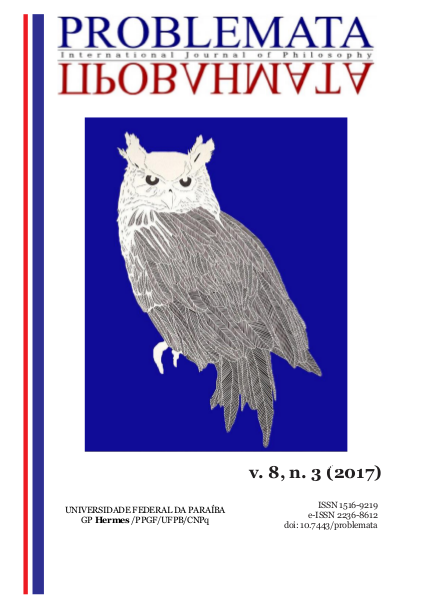O CONCEITO HUSSERLIANO DE CORPO: SUA DUALIDADE E FUNÇÃO NAS EXPERIÊNCIAS PERCEPTIVAS
DOI:
https://doi.org/10.7443/problemata.v8i3.33484Keywords:
Fenomenologia, Husserl, Corpo, PercepçãoAbstract
O propósito deste artigo é apresentar a noção husserliana de corpo, tema da fase tardia do pensamento de Husserl e ainda pouco investigado. A exposição parte da análise da relação de tal conceito com as experiências perceptivas, demonstrando que a teoria fenomenológica da percepção, ao contrário do que normalmente se supõe, leva em conta a função fundamental desempenhada pela corporeidade do sujeito. Com isso, investiga-se também a dualidade da noção por meio da importante distinção, elaborada por Husserl, de corpo enquanto objeto físico (Körper) e corpo “vivo” (Leib).
Downloads
References
ALCOFF, Linda Martín. Towards a phenomenology of racial embodiment. Radical Philosophy, n. 95, p. 15-26, 1999.
BEAUVOIR, Simone de. Le deuxième sexe. Paris: Gallimard, 2014.
DEPRAZ, Natalie, Transcendance et incarnation. Le statut de l'intersubjectivité comme altérité à soi chez Husserl. Paris: Vrin (Histoire de la philosophie), 1995.
FISHER, L.; EMBREE, L. (Ed.). Feminist Phenomenology. Dordrecht: Kluwer Academic Publishers. 2000.
HEINÄMAA, Sara. Toward a phenomenology of sexual difference: Husserl, Merleau-Ponty, Beauvoir. Rowman & Littlefield Publishers, 2003.
HUSSERL, Edmund. Husserliana 16. Ding und Raum. Vorlesungen 190/. Ed. Ulrich Claesges. Den Haag: Martinus Nijhoff, 1973.
HUSSERL, Edmund. Husserliana 5. Ideen zu einer reinen Phänomenologie und phänomenologischen Philosophie. Drittes Buch: Die Phänomenologie und die Fundamente der Wissenschaften. Ed. Marly Biemel. The Hague: Martinus Nijhoff, 1952, rpt. 1971.
HUSSERL, Edmund. Husserliana 6. Die Krisis der europäischen Wissenschaften und die transzendentale Phänomenologie. Eine Einleitung in diephänomenologische Philosophie. Ed. Walter Biemel. The Hague: Martinus Nijhoff, 1954, rpt. 1962.
HUSSERL, Edmund. A crise das ciências europeias e a fenomenologia transcendental. São Paulo: Forense Universitária, 2012.
MAJOR, Ulrich. “The Origin and Significance of Husserl's Notion of the Lebenswelt”, In David Hyder and Hans-Jörg Rheinberger (eds), Science and the Life-World: Essays on Husserl's Crisis of European Sciences, Stanford: Stanford University Press, 2010.
MCMULLIN, Irene. "Embodied Expression: The Role of the Lived Body in Husserl’s Notion of Intention-Fulfillment." European Journal of Philosophy (2015).
MURRAY, Stuart J., and Dave Holmes. "Interpretive phenomenological analysis (IPA) and the ethics of body and place: critical methodological reflections." Human Studies 37.1 (2014): 15-30.
RENDTORFF, Jacob Dahl. "The Phenomenological Tradition: Experience, Body and Ethics." French Philosophy and Social Theory. Springer Netherlands, 2014. 77-98.
STEIN, Edith. Zum Problem der Einfühlung. Halle: Buchdruckerei des Weisenhauses, 1917.
STOLLER, S.,(2005). Feministische Phänomenologie und Hermeneutik. Würzburg: Königshausen & Neumann.
STOLLER, S., & Vetter, H. (1997). Phänomenologie und Geschlechterdifferenz. Wien: WUV-Universitätsverlag.
Downloads
Published
Issue
Section
License
Authors who publish with this journal agree to the following terms:
- Authors retain copyright and grant the journal right of first publication with the work simultaneously licensed under a Creative Commons Attribution License that allows others to share the work with an acknowledgement of the work's authorship and initial publication in this journal.
- Authors are able to enter into separate, additional contractual arrangements for the non-exclusive distribution of the journal's published version of the work (e.g., post it to an institutional repository or publish it in a book), with an acknowledgement of its initial publication in this journal.
-
- Authors are permitted and encouraged to post their work online (e.g., in institutional repositories or on their website) prior to and during the submission process, as it can lead to productive exchanges, as well as earlier and greater citation of published work (See The Effect of Open Access).





